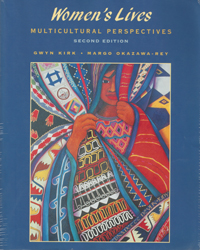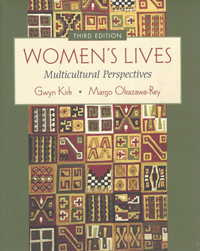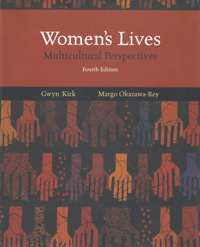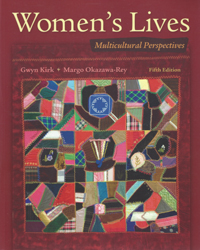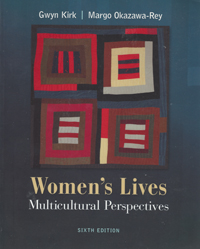Writing - Books
Writing: books
Mapping Gendered Ecologies
Mapping Gendered Ecologies: Engaging with and beyond Ecowomanism and Ecofeminism
-- K. Melchor Quick Hall and Gwyn Kirk (editors)
This collection includes the stories of teachers, organizers, activists, farmers, healers, and gardeners. From their many entry points, and in different voices and registers, contributors engage crucial questions of coexistence with nature in these times of overlapping climate, health, economic, and racial crisis.
A key part of developing this book involved an ongoing conversation between us, as editors from very different backgrounds, as we explained our experiences and perspectives to each other. Beyond that, the collection grew out of our networks and worldviews, a collaborative project, pieced together with patience and respect.
We hope these essays will resonate with students, teachers, and community members, and help move forward conversations and activities to remake the many broken relationships between people, and between people and the earth.
Gendered Lives
Gendered Lives: Intersectional Perspectives
— Gwyn Kirk & Margo Okazawa-Rey.
This book started out as two photocopied readers that we used in our classes at Antioch College (GK) and San Francisco State University (MOR) in the mid-1990s. We published it as Women’s Lives: Multicultural Perspectives with Mayfield and then McGraw-Hill. In 2019 Oxford University Press published a substantially revised 7th edition with this new title.
This compilation is really two books in one: 60 pieces by a range of authors and 12 overview essays by us that link this rich collection. We are concerned about the many challenges facing humankind, from gender-based violence, reproductive justice, and a lack of well-paying work to migration, environmental destruction, militarism and war. How will our society provide for its people? How will people share this overburdened planet? Genuine security and sustainability—at personal, community, national, and global levels—provide the wider framework for the book.
Social Justice
Social Justice: A Journal of Crime, Conflict and World Order, vol. 46 (1), 2020
Unsettling Debates: Women and Peace-Making
— Suzy Kim, Gwyn Kirk, and M. Brinton Lykes (guest editors)
Adopting a transnational perspective, editors and contributors highlight various ways in which women seeking a just peace have organized against militarized patriarchy and its forms of structural violence within and across communities and nation states. (See the Table of Contents and the editor’s introduction.)
This collection grew out of an International Women’s Day event at Rutgers University on March 8, 2017. Earlier, the editors were involved in Women Cross DMZ, when 30 women from 15 nations crossed the Demilitarized Zone (DMZ) from North to South Korea on May 24, 2015, International Women’s Day for Peace and Disarmament, to draw international attention to the need for a peace agreement to finally end the Korean War.
Social Justice: A Journal of Crime, Conflict and World Order, vol. 27 (4), 2000
Neoliberalism. Militarism, and Armed Conflict
— Gwyn Kirk and Margo Okazawa-Rey (guest editors)
Bloated military spending worldwide means that many communities are negatively affected by military operations and skewed budget priorities. Part I of this special issue explores the interrelationship between militarism and neoliberalism, from the role of the WTO, arms proliferation, and the militarization of border communities, to the need for cooperative political organizations, and a redirection of public investment to meet human needs. Part II includes documents focused on demilitarization and visions of genuine global security, based on sustainable environmental and economic principles, accountable political systems, and sturdy connections among people that acknowledge and transcend identities and territories. Also, we are concerned with how militarism affects women and draws on deep-seated patriarchal assumptions about women’s roles, capabilities, and sexuality. (See the Table of Contents and the editor’s introduction.)
Greenham Women
Greenham Women Everywhere: Dreams, Ideas and Actions, from the Women’s Peace Movement
— Alice Cook and Gwyn Kirk.
We were inspired to write this book by the women we met through Greenham Common Women’s Peace Camp. This started in 1981 outside USAF Greenham Common in England, where NATO planned to site nuclear-capable cruise missiles. The vitality of the peace camp was a dramatic contrast to the bleakness and dreadful purpose of the base—two opposing value systems literally on opposite sides of the fence. We interviewed women involved in this movement. We drew on leaflets and newsletters, personal conversations, our participation in workshops and organizing meetings. We explored what it means—emotionally, practically, and intellectually—to become activists, and the effectiveness of women’s nonviolent direct action.
Published in 1983 by Pluto Press in Britain and South End Press in the United States, this book is unfortunately out of print but available in libraries or through used booksellers.
French translation: Des femmes contre des missiles: Rêves, idées et actions à Greenham Common, transl. Cécile Potier (Paris: Éditions Cambourakis, 2016).
Japanese translation: Gurīnamu no onna tachi: kaku no nai sekai o mezashite, transl. Kondo Kazuko (Tokyo: Hachigatsu shokan, 1984).
Urban Planning
Urban Planning in a Capitalist Society
— Gwyn Kirk
Published in London in 1980 and reissued by Routledge Library Editions in 2018, this book examines strengths and weaknesses of the British urban planning system from the 1940s to the 1970s. People need affordable housing, sustainable livelihoods, efficient public transportation, nourishing food, and safe water supplies. Capitalist ventures focused on profitability will only meet these needs if the financial returns compare favorably to investing in commodities, manufacturing, mineral extraction, and trade—or if governments underwrite and intervene in the urban development process.




